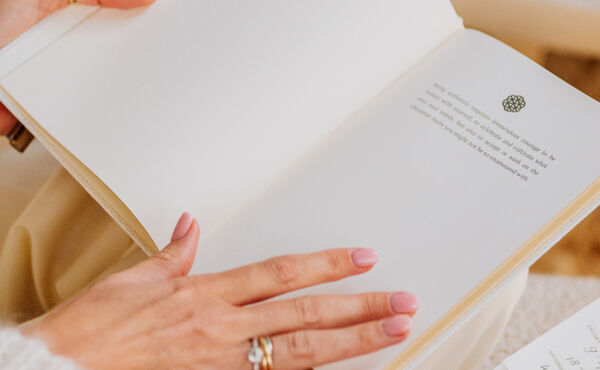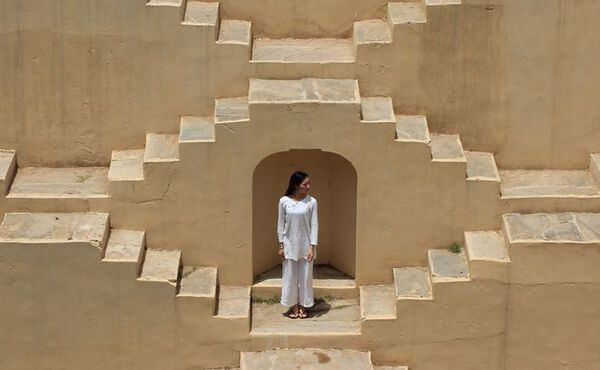From the self-awareness needed to change to embracing silence to reassess your values, follow our tips and advice to learn how to live an authentic life every day.
As we’ve discovered and explored throughout this masterclass, having a good understanding of what you believe in and stand for allows you to act in a way that solidifies your values, not only to yourself but to those around you.
We’ve also mentioned that being authentic is not always going to be the easiest pathway to take. Staying true to what you think is right and good can mean going against what everyone else is doing or saying, and therefore can be the harder choice to make. It can also mean addressing elements of your personality and behaviour that are currently not the most authentic and require self-awareness to change.
However, as living authentically leads to the end goal of a truly fulfilled and content life, dedicating time and effort to it is the only way to go. Here we will explore how to live an authentic life as well as expert advice from bestselling author, authenticity expert and psychologist Kelly Weekers to help you stay true to yourself all day, every day.

1. Authenticity does not mean perfection
Living an authentic life and being as authentic as possible does not mean you are aiming to be perfect. We are here in this life to learn. Being authentic isn’t about nailing this truer version of yourself, it’s about working to get to a place where being authentic is second nature. During your journey to authenticity, you might fall back into old patterns and that’s okay. “Nobody is perfect. We will all make mistakes even when you have a good grip on being authentic. What’s important is acknowledging those mistakes, learning from them and changing so it doesn’t become a repeated behaviour,” says Kelly.
“Most people have plenty of hobbies, but failure is not one of them. No one wants to mess up and fail; the only route to success is up, we tell ourselves”, she adds. “Yet, the truth of the matter is that we can’t learn or grow, and thus be successful, happy or our authentic selves, without also failing miserably from time to time. Small and big goals can only be achieved by leaving our comfort zone. And yes, this also happens to increase the chance of making a mistake. As long as you don’t see mistakes as something to avoid, you can learn from most of them. It’s by making mistakes that you learn what does and doesn’t work for you.”
Taking responsibility when you make a mistake can actually become one of the most authentic behaviours you can have.
2. Authenticity in all areas
We are all multi-faceted people and because we have so many roles that we play - friend, boss, partner, parent, etc. - there may be certain areas of life where you find it easier to be more authentic than in others. This could be due to the people you’re surrounded by in those environments or the expectations of you in those scenarios.
For example, being authentic with your friends or partner should be second nature because you shouldn’t have any fear of them not understanding you. If they don’t, you should be able to talk about it so that they understand why you do what you do. If that’s not possible then the hard part of being authentic rears its head, because do you want to surround yourself with people who don’t share your values or at least understand why they’re important to you?
“Being authentic will make you (re)claim your boundaries and that’s something some people around you may struggle with, as they benefit from you not having them,” explains Kelly. “It's normal for friends or lovers to both change and possibly develop in different ways over time. It’s important to allow each other that personal growth. For me, it’s super important that the people in my inner circle are happy. And the most beautiful insight is that I now also have the courage to allow myself to expect that in return.”
At work or in unfamiliar social situations you may find it harder to be more authentic and slightly change your behaviour and opinions to fit in. “Finding yourself in a disagreement with someone can be tough, especially for people-pleasers but why not reframe it as an opportunity for growth?” asks Kelly. “Even if those around you question your values or opinions, does that not open up a discussion and give you a chance to learn about other people’s perspectives, letting tolerance shine through?”
There will, however, be times when the best thing you can do is acknowledge to yourself that a person or situation is stifling your ability to be authentic and take yourself away rather than having to conform to what’s happening around you. Always remember, authenticity is not a free pass to be inconsiderate or unkind, we should be open to hearing other people’s opinions and views of the world because that’s how we learn. That’s why it can be helpful to write your core values down as you did in the how to be authentic guided session so that you can keep looking back to them and see if any need to be fine-tuned, added or deleted.
As the American poet, E. E. Cummings wrote: “It takes courage to grow up and become who you really are,” and that’s the core of authenticity.
To add subtitles in your language to the video, please follow these instructions. Click play on the video below. Tap on the settings icon (it looks like a cog). Click on Subtitles/CC, then Auto-Translate, select your language and enjoy the video.
3. Authenticity gives you freedom
Kelly notes that to be truly authentic you need to stop caring so much about the opinions of others. “Whether you think someone judges you or they actually tell it to your face, you are always the one who decides what you want to do with that judgement. Sure, you can fret and worry about it, get angry or feel sad, but you could also choose to just ignore it. Your life, your choices! People don’t always have to agree with your choices. And not all people have to like you. That’s never going to happen anyway, no matter what you do.”
Kelly suggests writing down which opinion(s) you are no longer going to worry about as much, since they’re getting in the way of leading a joyful life. “Are they offline opinions from relatives or colleagues? Or are they online opinions on Instagram, for instance? It’s your choice to determine which voices you want to put on mute and which ones you want to turn up.
“Now you know which opinions you won’t stand for, you will have a better idea of what your boundaries are,” says Kelly. “It could be no longer people pleasing to be liked or having the courage to take a job you truly want, not because of expectations from family or friends. In these scenarios, ask yourself: what is the very worst thing that could happen? Try to visualise for yourself your worst-case scenario and then ask yourself: okay, and if that happens, so what? What happens then?
“I bet that nine times out of ten, it won't be that bad. Instead of always thinking about what could go wrong, rationalise those negative consequences. A more interesting question is not to ask myself what could go wrong but what could go right?”
4. Authenticity in silence
Taking time out from all the noise of busy lives can help embed what it means to you to live authentically. Whether this is in a dedicated reflective authenticity meditation, silently enjoying your morning coffee or pausing before you make a decision, take time to remind yourself of what is important to you and what makes you happy.
“Self-awareness is crucial for making the changes you want. That level of understanding helps you discern which choices are needed to make your life more authentic. You might realise you have to address a particular personal issue in your love life or your friendships. Or maybe a career change is in order? You could discover you don’t want to change anything just yet, because you’re happy as it is,” says Kelly.
“By operating from this new more authentic mindset, you get the chance to shift the situation. You will get better and better at this, and eventually you will act differently than you would have done before, because you’ll be approaching the situation with a different mindset. You’ve adopted a new authentic attitude – the one that’s truly you - and each time you apply it, step by step, it will become your new autopilot (or authentic pilot, as we like to call it).”
5. Authenticity only leads to good
You cannot be authentic without being open to change, learning new points of view and experiencing different things. Authenticity is not a rigid discipline; it is a practice that has to develop and adapt just as life does. The path to authenticity can be a hard journey to travel. Becoming aware of your true self may mean you have to disconnect from some people and break old habits and that’s a hard thing to realise and do. But it is important to remember that it is only going to bring more positive things into your life. Being authentic means being who you really are, it’s tapping into the things that make you happy and bring you fulfillment in life and who wouldn’t want that?
“The best day of your life is when you start following your dreams instead of what others expect from you. If anything can move mountains, it is believing in your own power,” says Kelly. “By working on your authenticity, you are finally discovering the infinite possibilities within you. You are not changing, you are tapping into how to be you.”
This article is part of our authenticity masterclass to help you discover who you truly are and to empower you to lead and live a more authentic life. By allowing yourself to tap into your true essence you will be able to connect with the world around you in a new and positive way.
-
Promotions
View full details€14,90 €19,90 -
View full details€33,90








